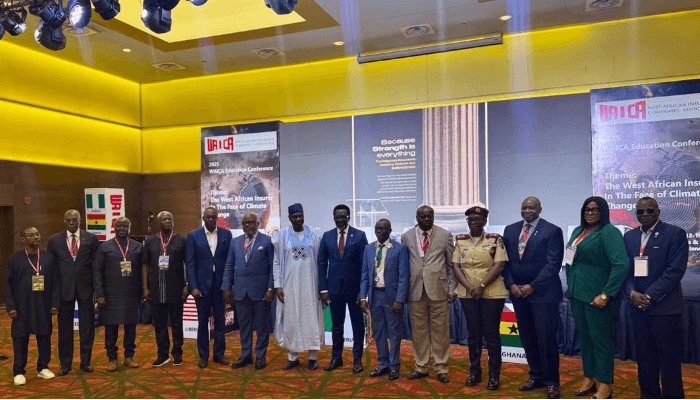Insurance seen closing finance gap as climate risks threaten food supply
Insurance experts in the West African sub-region have identified critical role of insurance in closing finance gap towards tacking climate change risks.
According to the experts, traditional budgetary responses are no longer sufficient, hence, the need to strengthen financial instruments that give opportunity to anticipate shocks rather than merely react to them.
The experts made the observation at the ongoing 2025 Education Conference of the West African Insurance Companies Association (WAICA) taking place in Lagos with theme: ‘The West African Insurers in the Face of Climate Change’.
Olusegun Omosehin, commissioner for Insurance/CEO, National Insurance Commission (NAICOM) in his remarks at the event said climate change is rewriting the narrative of our region. “It is testing the strength of our economies, the endurance of our communities, and the responsiveness of our institutions.
Read also: NHIA partners NBS on health insurance data to boost service delivery
“It has become a macroeconomic threat, influencing fiscal policy, national budgets, and the stability of our financial systems.”
According to him, the evidence is sobering. “In 2024, flooding affected over 7.5 million people across 16 West African countries. Nigeria alone accounted for 1.3 million displaced persons. In 2025, over 33,000 Nigerians were displaced, 3,800 homes destroyed, and 5,300 hectares of farmland submerged, threatening food security and economic stability.”
Omosehin said these are not just statistics, they are stories of disruption, loss, and delayed development, but however noted that within this crisis lies an opportunity, to redefine the role of insurance as a force for resilience and sustainable development.
On how insurance can respond adequately, he called on insurers, reinsurers and leaders across WAICA member states to swing to action.
“We must innovate boldly, developing parametric and microinsurance products tailored to our region’s climate realities; invest in data and technology to improve climate modelling, risk assessment, as well as product delivery”.
He also called for collaboration across borders, noting that pooling risks and resources to build regional resilience expand inclusion, ensuring insurance reaches farmers, market women, artisans, and micro-entrepreneurs who are the backbone of our economies are critical.
“We must prioritize capacity building, investing in the next generation of insurance professionals, while the industry insurance must evolve from a transactional service to a strategic enabler of development.”
Uzoka Anite, minister of State for Finance, Federal Republic of Nigeria in her keynote address said, across West Africa, floods, droughts, and coastal erosion are already destroying livelihoods, straining public finances, and threatening food security. “Each disaster brings not only human tragedy but also heavy fiscal burdens.”
Uzoka, who was represented by Ali Mohammed, director, Home Finace, Federal Ministry of Finance said, this reality makes climate risk a macroeconomic concern requiring proactive financial planning, noting insurance therefore becomes indispensable as a mechanism to share and absorb shocks that governments alone cannot shoulder.
She said the Federal Government recognizes insurance as a pillar of our financial architecture, alongside banking, capital markets, and pensions, noting that the Nigerian Insurance Industry Reform Act (NIIRA 2025) represents a bold step toward modernization.
The Act strengthens the capital base of insurers, enhances consumer protection, expands compulsory insurance to critical sectors such as agriculture and infrastructure, and integrates insurance into public–private partnerships for climate resilience. Beyond reform, NIIRA 2025 signals Nigeria’s determination to build a credible, transparent, and inclusive insurance industry aligned with national economic diversification goals.
Backing regional cooperation through WAICA, she said no nation can confront this threat alone. The same storms that affect Nigeria affect Ghana, Sierra Leone, Liberia, and The Gambia, so our solutions, too, must be collective.
Read also: Agric experts harp on livestock investment to tackle food security
“Through WAICA, we can develop regional risk-pooling and reinsurance platforms; exchange data and expertise on climate modelling and disaster forecasting; and as well as build professional capacity for innovative, sustainable insurance products.”
Such cooperation she noted will transform insurance from a business venture into a development enabler for agriculture, trade, and small enterprises, she said.
“Insurance will achieve its true impact only when it reaches everyone including farmers, market women, artisans, and micro-entrepreneurs. We must promote micro-insurance, digital channels, and parametric products that pay out instantly based on verified data.”
By doing so, we expand coverage, deepen financial inclusion, and strengthen resilience at the grassroots, which remains a priority of the Federal Ministry of Finance, she said.
Omosehin concluding said, NAICOM as a regulator is committed to enabling policies that foster collaboration between operators, regulators, and development partners.
“Strengthening climate resilience across West Africa demands a unified approach, one that blends sound regulation, market innovation, and strategic partnerships.

